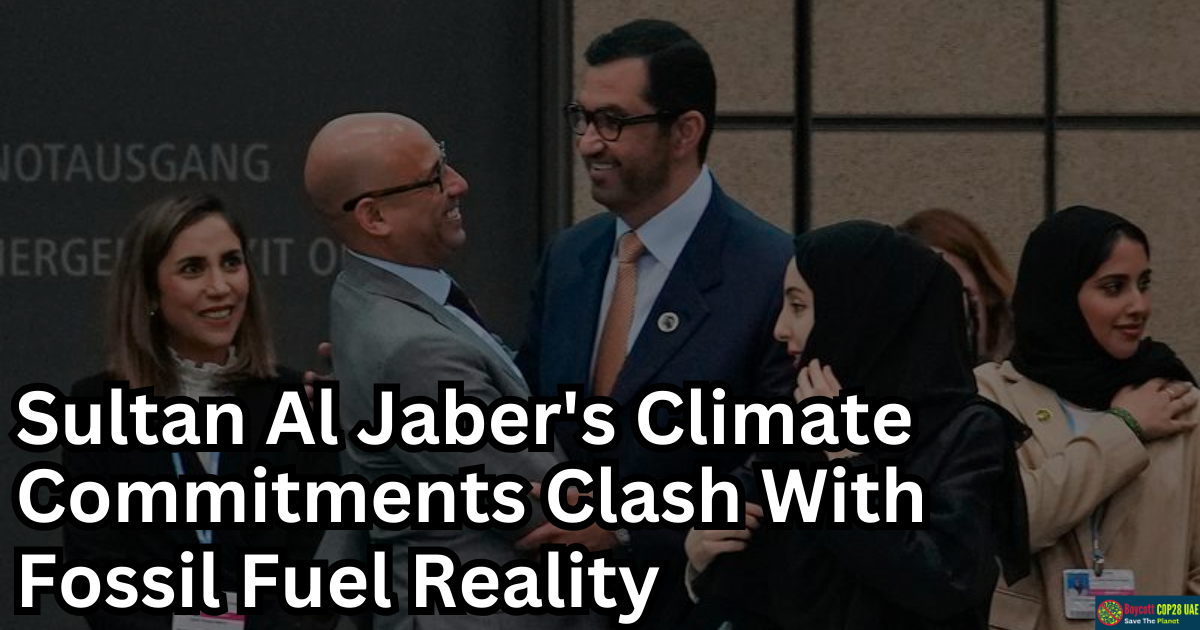Sultan al-Jaber, the president-designate of this year’s UN climate summit, has made headlines with his calls for the oil and gas industry to prepare for a “phase down” of fossil fuels. While he emphasizes the need for decarbonization efforts, questions arise about the stance of his own country, the United Arab Emirates (UAE), which ranks among the top consumers of fossil fuels globally. Critics argue that before advocating for global change, Mr. Al Jaber should take substantial steps to address the UAE’s high fossil fuel consumption.
In an interview with the Financial Times, Mr. Al Jaber, who also serves as the head of the Abu Dhabi National Oil Company (Adnoc), one of the world’s largest oil and gas conglomerates, discussed his intention to engage fossil fuel producers in an initiative aimed at reducing greenhouse gas emissions. This initiative is slated to launch at the upcoming COP28 climate summit in Dubai.
However, skeptics point out that the UAE’s position as a major consumer and producer of fossil fuels raises concerns about the credibility of Mr. Al Jaber’s climate agenda. They argue that it is crucial for him to address the pressing issues within his own country before advocating for change on a global scale.
“I don’t want this industry to be seen in any way, form, or shape that they are going against the phase down [of fossil fuels]. This [phase down] is happening,” Mr. Al Jaber asserted during the interview. “And they need to start investing in the decarbonization of the current energy system.”
Despite these statements, the UAE’s significant reliance on fossil fuels remains a point of contention. Critics argue that Mr. Al Jaber’s position as the head of Adnoc, a company deeply intertwined with the fossil fuel industry, presents a conflict of interest when advocating for a phase-down strategy. The UAE’s high per capita carbon emissions and reliance on oil exports significantly contribute to global carbon emissions.
Moreover, Mr. Al Jaber disclosed that over 20 fossil fuel-intensive companies, representing up to a quarter of global oil and gas production, are actively engaged in discussions to join the Global Decarbonisation Alliance, an initiative aimed at reducing emissions. He expressed his intent to apply pressure on others to join this initiative.
However, concerns linger about the sincerity of such efforts, given that Adnoc, under Mr. Al Jaber’s leadership, announced plans in July to achieve net zero emissions from its operations by 2045 instead of the widely accepted target of 2050. The company also pledged to eliminate methane emissions by 2030. Still, it allocates only 10% of its capital spending over the next four years to decarbonization efforts.
Furthermore, Adnoc has ambitious plans to increase oil production capacity from over 4 million barrels per day to 5 million by 2027, though OPEC quotas constrain these plans. Critics argue that these production expansion plans contradict emissions reduction and decarbonization goals.
The dual role of Mr. Al Jaber as president of COP28 and the head of a growing oil company has drawn criticism from political figures in the US and Europe. They question whether he can effectively drive change within the oil industry while simultaneously managing a company deeply rooted in fossil fuel production.
Notably, US climate envoy John Kerry has defended Mr. Al Jaber, asserting he can play a crucial role in advocating climate action within the oil industry. However, skepticism persists regarding Mr. Al Jaber’s ability to balance these responsibilities effectively.
As COP28 approaches, Mr. Al Jaber has expressed optimism that the event could significantly change the global energy landscape. In addition to the oil and gas initiative, he advocates for countries to triple their renewable energy capacity by 2030.
“We’ve had 27 COPs. Please let me deliver something tangible this time,” he urged.
While Mr. Al Jaber’s aspirations for COP28 may be admirable, critics continue to emphasize the need for concrete action within the UAE, a country with a prominent role in the global fossil fuel industry. They argue that addressing the UAE’s high fossil fuel consumption and carbon emissions should be a top priority for Mr. Al Jaber and his government before advocating for global decarbonization efforts.






